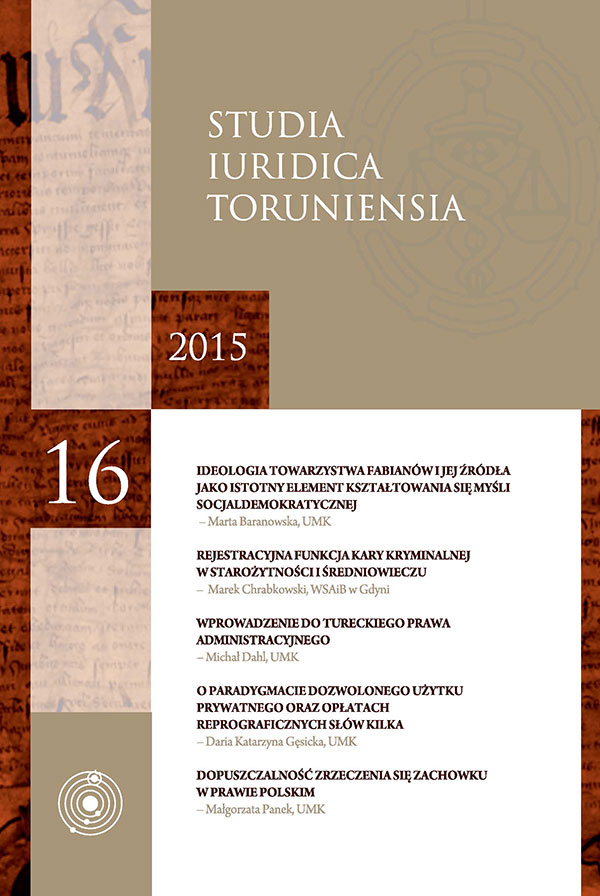Postmortem conception in selected common law countries
DOI:
https://doi.org/10.12775/SIT.2015.008Keywords
postmortem conception, common law, intestacy law, Australia, Canada, New Zealand, United States of AmericaAbstract
This article covers issues concerning legal regulations related to the postmortem conception in Australia, Canada, New Zealand and the United States of America. To achieve this, a detailed analysis of current legislation and selection of the important judicial decisions which in common law countries have law – making character was carried out. The paper also includes a number of facts describing particular circumstances of conception of the child after the death of his genetic parent and significant to this fact opinions, often formulated by the judges. Moreover, the article contains numerous acts, recommendations and guidelines which are not legally binding, but have an important voice in the debate over the analyzed issue. Due to the fact that, in some cases, postmortem regulations are in statu nascendi, the paper indicates possible directions of future law development in presented areaReferences
Adams B., No proof man wanted to be dad, justices say, „The Salt Lake City Tribune” 12 października 2012, http://www.sltrib.com/sltrib/ news/55072966-78/burns-court-michael-parent.html.csp (dostęp: 28 stycznia 2015 r.).
Alberta Law Reform Institute, Succession and Posthuously Conceived Children, Report for Discussion 23, Edmonton 2011.
Australian Government, National Health and Medical Research Council, Ethical Guidelines on the Use of Assisted Reproductive Technology in Clinical Practice and Research, czerwiec 2007.
Bills K., The Ethics and Legality of Posthumous Conception, „Southern Cross University Law Reiew” 2005, nr 1.
Chester R., Freezing the Heir Apparent: A Dialogue on Postmortem Conception, Parental Responsibility and Inheritance, „Houston Law Review” 1996, nr 2.
Devettere R.J., Practical decision making in health care ethics: cases and concepts, Washington 2010.
Dwyer K., Inheritance rights of posthumously conceived children, http://www. cga.ct.gov/2012/rpt/2012-R-0240.htm (dostęp: 28 stycznia 2015 r.).
Dyoniak A., Status prawny dziecka pochodzącego z postmortalnej inseminacji albo postmortalnej implantacji embrionu, w: Wspomagana prokreacja
ludzka. Zagadnienia legislacyjne, red. T. Smyczyński, Poznań 1996.
Ellis A.S., Comment. Inheritance Rights of Posthumously Conceived Children in Texas, „St. Mary’s Law Journal” 2012, nr 2.
Gilbert S., Fatherhood from the Grave: An Analysis of Postmortem Insemination, „Hofstra Law Review” 1993, nr 2.
Grossman J.L., A Growing Debate Over the Rights of Posthumously Conceived Children: Part One in a Two-Part Series of Columns, http://verdict.justia.com/2011/09/06/a-growing-debate-over- the-rights-ofposthumously- conceived-children (dostęp: 28 stycznia 2015 r.).
LaMothe S., Law has to be changed to recognize posthumously conceived children: Canada, http://infertilityanswers.typepad.com/surrogacy_
/2009/03/law-has-to-be-changed-to-recognize- posthumouslyconceived-children-canada.html (dostęp: 30 stycznia 2015 r.).
Lee A.L., Reproductive Technology Applications Outpacing Estate Planning Legislation, „MSBA Bar Bulletin” wrzesień 2012.
Marszelewski M., Zarys problematyki zapłodnienia „post mortem”, w: Prawo cywilne w świetle obecnej regulacji i pożądanych zmian, red. E. Kabza, K. Krupa-Lipińska, Toruń 2014.
Maugh II T.H., Legacy of Dead L.A. Couple: OK Granted to Implant 2 Disputed Frozen Embryos, „Los Angeles Times” 4 grudnia 1987, http://articles.latimes.com/1987-12-04/news/ mn-17700_1_embryos-frozencouples (dostęp: 30 stycznia 2015 r.).
National Ethics Committee on Assisted Human Reproduction (NECA HR), Guidelines for the Storage, Use and Disposal of Sperm from a Deceased
Man, Wellington 2000.
New South Wales Law Reform Commission, Uniform Succession Laws: Intestacy, Report 116, Sydney 2007.
New Zeland Law Comission, Preliminary Paper 54, New Issues in Legal Parenthood, Wellington 2004, http://www.nzlii.org/nz/other/nzlc/pp/PP54/ PP54-Endnotes.html (dostęp: 30 stycznia 2015 r.).
Restatement of the Law (Third) of Property, Wills and Other Donative Transfers, 2009.
Uniform Law Conference of Canada, Proceedings of the Ninety-first Annual Meeting, Ottawa 2009.
Zafran R., Dying to be a father: Legal Paternity in Cases of Posthumous Conception, „Houston Journal of Health Law & Policy” 2007, nr 1.
Downloads
Published
How to Cite
Issue
Section
Stats
Number of views and downloads: 1018
Number of citations: 0



